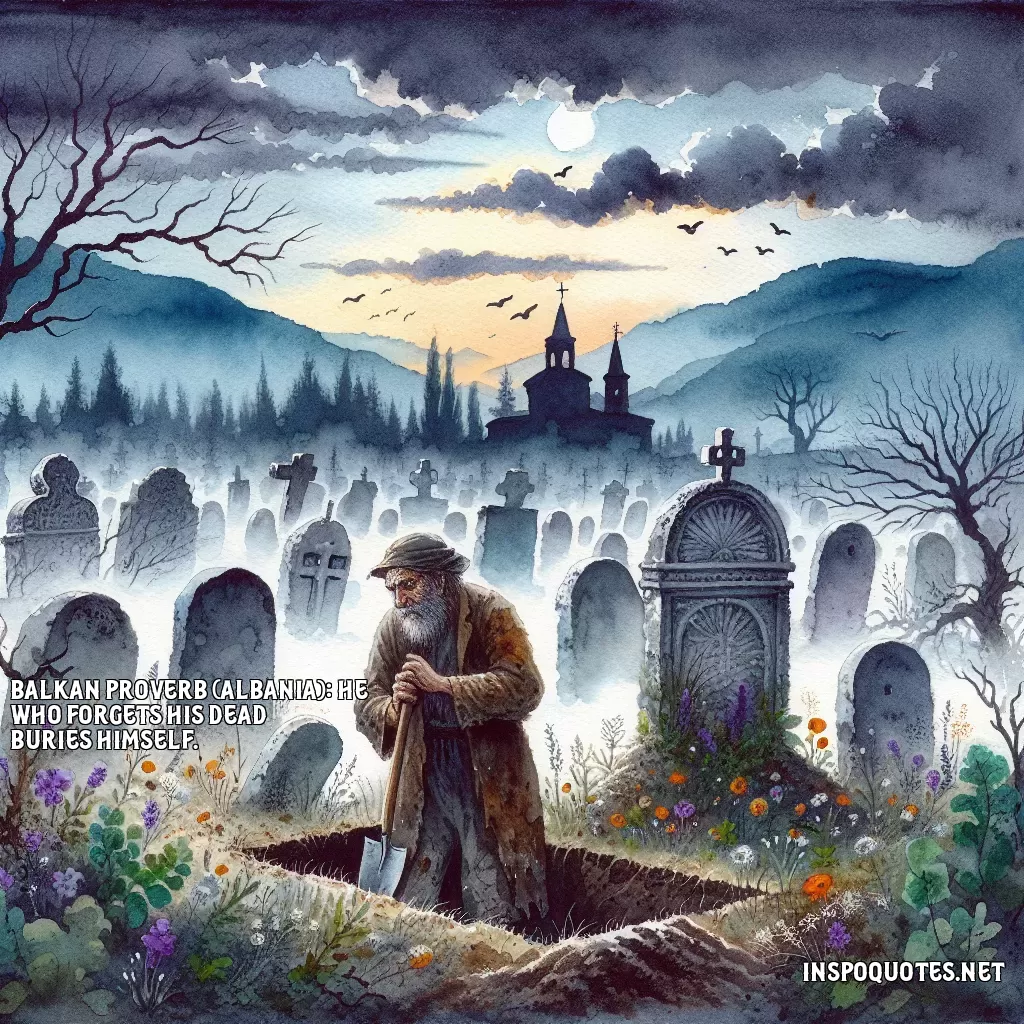
Balkan Proverb (Albania): He who forgets his dead buries himself.
Author: Robert Elsie
👁️ 10 views
The Balkan proverb "He who forgets his dead buries himself" speaks to the deep-seated cultural importance of memory and the honoring of those who have passed away. This saying, attributed to Albanian tradition, underscores how integral the remembrance of ancestors and deceased loved ones is to personal and communal identity. At its core, the proverb suggests that neglecting to remember the dead is tantamount to self-neglect. Those who have departed often leave behind legacies, values, and histories that are vital to the living. By forgetting them, individuals may sever an essential link to their past, undermining their own identity and personal heritage. The "burial" is metaphorical, indicating a loss of self-awareness and connectedness. Many cultures emphasize the importance of honoring the deceased through rituals, stories, or monuments, acknowledging that the lives and sacrifices of past generations have shaped the present. Remembering the dead can provide guidance, wisdom, and continuity, acting as a moral and ethical anchor. It also serves practical functions, transmitting cultural knowledge and lessons learned. In this light, the proverb is a caution against shortsightedness. By failing to honor the past, individuals risk becoming untethered, losing the insights that their forebears might impart. Consequently, in forgetting those who have died, one symbolically "buries" a part of themselves—a loss of grounding and purpose that comes from severing the ties to one’s ancestry and history. This proverb, therefore, champions the act of remembrance as essential to preserving both personal and collective identity.
Quote By: Robert Elsie
Robert Elsie (1932-2017) was a renowned scholar, translator, and writer, celebrated for his profound contributions to the study of Albanian language and culture. Born in Berlin, Germany, Elsie developed a keen interest in languages early in life, which ultimately led him to study Albanian in depth. His passion for this lesser-known language and its literature propelled him to become one of the foremost experts on Albania, its culture, and its literary heritage.
Elsie's academic journey was marked by a series of impressive achievements. He obtained his degree in Albanian studies from the University of Munich, where he developed a strong foundation in both the linguistic and cultural aspects of Albania. His dedication to the field took him to various institutions, including the University of Tirana in Albania, where he contributed to the development of Albanian literature in the academic landscape. Elsie’s work included not only scholarly research but also translations of significant Albanian literary works, making them accessible to a broader audience. His translations of prominent Albanian authors such as Ismail Kadare and Dritëro Agolli showcased his skill in capturing the nuances and richness of the original texts.
Throughout his career, Robert Elsie published numerous books and articles that explored various themes in Albanian history, literature, and culture. He was deeply invested in promoting Albanian heritage outside of Albania, often speaking at international conferences and engaging in cultural diplomacy. His dedication went beyond academia; Elsie often highlighted the importance of recognizing Albania's unique position in the Balkans and Europe.
In addition to his scholarly pursuits, Robert Elsie was also a passionate advocate for the Albanian community, working tirelessly to bridge cultural gaps and foster understanding. His legacy endures not only through his extensive body of work but also in the hearts of those who continue to study and appreciate Albanian culture thanks to his efforts. Robert Elsie’s life and work remain a testament to the power of language in connecting peoples and cultures across the globe.